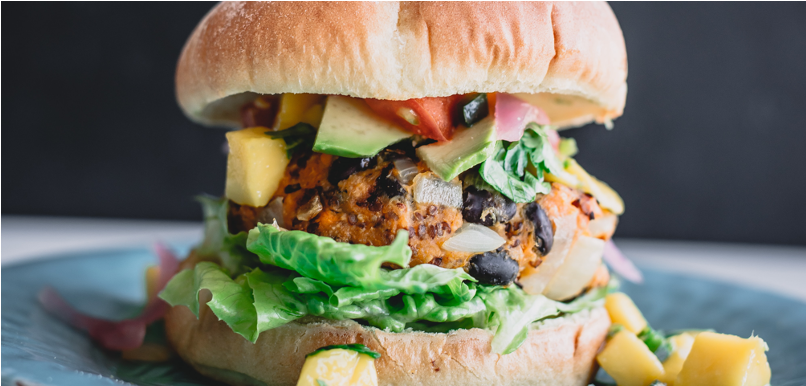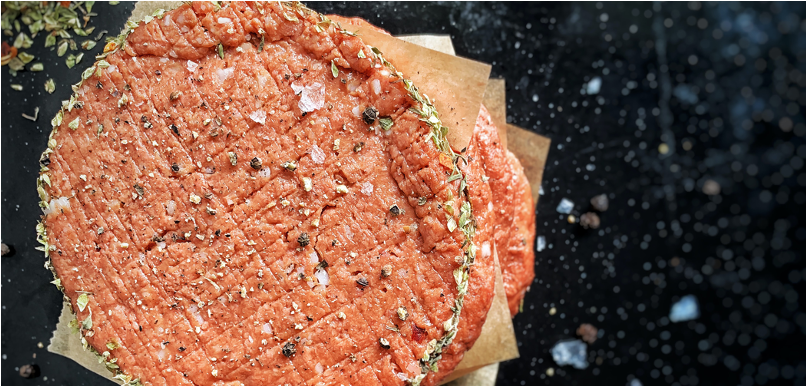
In this article we look at Engineered Magic that sits as part of the wider social trend 'Don't Stop the Gratification', a movement that is centred around breaking down unnecessary barriers, making food & drink consumption as straightforward and easy as possible.
The plant-based revolution was already well underway before the pandemic, largely driven by concerns around health - both personal and planetary - and ethical considerations with regards to industrial agriculture. Now the current crisis has only increased awareness around these issues, and interest around plant-based eating. Cue even more research, development, innovation and investment in the plant-based sector - as well as a new wave of interest in lab grown (aka cultured, motherless or cell-based) meat, dairy and seafood.
If you're a trendhub subscriber read the detailed reporting – Click Here!
If you'd like to watch the supporting video click here to watch on trendhub.

| The plant-based revolution is now bona fide mainstream, and the pandemic is accelerating it further. COVID-19 has brought attention to the fragility of our traditional food chains and highlighted the impact of animal agriculture on both planetary and personal health. With this is mind, reports of animal-based meat shortages and price increases, more consumers are turning to plant-based alternatives.
The biggest players in the food world are investing in this space… Nestlé being one but also on board are others such as, Cargill, Tyson and Perdue – they have all entered the fray with plant-based offerings. Nestlé has just announced plans to build a dedicated production facility for plant-based products in China (it's first dedicated site in Asia). We must also look at the other end of the spectrum as start-ups continue to push the boundaries with innovative products; Daring Foods, Plantible, Rebellyous and Perfect Day… just a few brands who are securing notable funding and partnerships. We're no longer just talking nut milks and bleeding burgers! Plant-based lamb, goat, cheese, eggs, fish, chicken and pork are all becoming increasingly comparable to the 'real thing' in texture, taste and of course price point.
With health & safety at the forefront of consumer minds, there is increasing pushback against products with complex, lengthy ingredients lists and those which are perceived as over 'processed'. Increasingly, we see opportunity for plant-based products that are 'clean label' - i.e. fewer ingredients, which occur naturally and/or have names you recognise. And there are already companies making headway in this regard; e.g. Planted and Daring Foods both make chicken alternatives from just five or six natural ingredients. |
|

| Even though demand for seafood is reported to be at an all-time high, consumers still have concerns about sustainability, supply and overfishing. Innovative start-ups are looking to position plant-based seafood as a long-term solution, taking a cue from the booming popularity of plant-based meat alternatives, however this revolution is still in its infancy. According to the Good Food Institute, annual sales of fish substitutes in the US are around $10m compared with $800m for plant-based meat – in fact, the total research and development within this sector is said to have amounted to just $10m-$20m so far.
As the interest in seafood alternatives rise, change is in the air… even big brands are jumping on board, as exemplified by the recent partnership between Bumble Bee (known for canned tuna) and Good Catch (known for fish free 'tuna'). However, that is just the beginning… Nestlé says that it is aiming to debut vegan 'tuna' salad by the end of 2020 whilst Impossible Foods has announced it's working on plant-based fish products. As interest for seafood alternatives grow, so too does the rate of innovation and product development; we're starting to see an ever-increasing variety of products from 3D shrimp to fish made from fungus.
Many consumers eat fish and seafood not just for taste, but also nutritional value as they are rich in vitamins and nutrients like Omega 3, potassium and magnesium (a particular hot nutrient in the drive for immunity). Therefore, to be truly comparable to the 'real thing', alternatives need to have similar nutritional credentials. Indeed, proponents argue that plant/cell-based products can be even more healthy than their commercially fished counterparts, as bypassing fish farming potentially means fewer contaminants (e.g. mercury, toxins, parasites). |
|

| Within the motherless (aka cultured, cellular or lab grown) meat sector, sustainability and ethical concerns are driving fast paced innovation, just as in the plant-based sphere. This is all about using biotechnology and engineering techniques to produce something that is equivalent to the 'real thing' in terms of taste, texture and nutritional content. Pioneers in the sector are pushing for large scale factory production as these products are currently created in labs and on a small scale. Of course, this isn't a new prospect as we've heard of lab grown meat before. As there is surging interest in meat alternatives generally, the sector is experiencing a new wave of interest and sizeable investment from industry players. The current pandemic has heightened awareness of the fragility of our plant and food chains which has further accelerated consumers interest in this sector.
If you thought this was all about finding the next Impossible burger, guess again. Developers are looking to use biotech processes to recreate just about anything - including whole tissue products like chicken breast, plus high-end products like Foie gras. Indeed, JUST Meats have even partnered with a Japanese ranch specialising in wagyu genetics to develop cultured, high grade wagyu steak! And let's not forget about dairy... e.g. Motif FoodWorks is working on recreating attributes of animal fat structures which could be used to improve fat performance of alternative meat and dairy; think marbled 'steak' and improved melting quality for alt-cheeses.
Of course, there are still barriers to overcome, not least of these regulatory approvals…from food safety standards to definitions, there are a lot of hurdles to jump in this regard. However, consumers themselves are another obstacle the sector has to work with as they still need to be won over by the 'New Natural'. Commercially produced lab grown meat (aka labriculture) could be a reality after all, and sooner than we think as fast paced development and a group of hungry, pioneering start-ups push the forever growing boundaries in this super progressive sector that's tackling some of societies biggest food challenges head on. |
|

| In this article we've highlighted the relevance and shifts that are likely to evolve and develop in the COVID-era through the lens of Engineered Magic. By considering these shifts and how you as a business, brand, start-up or entrepreneur, pivot and adapt in consideration of them, will mean that you're well positioned to succeed in this COVID-era in food and drink.
In article 11 we'll be looking at the social driver 'Cultural Creativity', looking at the mega trend Cultural Exchange through the lens of COVID-19 and the longer terms shifts that we expect to see manifest.
So join our TFP community for the details of article 11, our recent special articles and all the latest food & drink trends foresight. Visit thefoodpeople.co.uk or click here and complete in the footer!
Stay safe, keep well and we'll see you in article 11. |
|
Sign Up
Stay at the forefront of trends…
Join the TFP community to receive the latest FREE to access food and drink trends and future foresight




